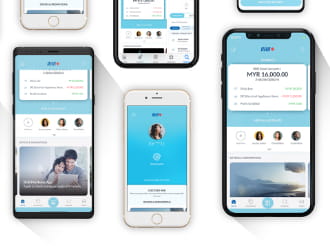Taking the pain away from debt – and coming out on top
Many of us struggle with debt, but it’s not an easy topic to talk about. With the right approach, you can effectively manage your debt and pave the way for a secure financial future.
The struggle with debt is never easy to discuss, even with our closest friends. There’s the fear of being seen as a failure, being judged, or looked down upon. There’s the guilt and shame we feel if we believe we should have handled it better. There’s the strain it places on relationships, and the fear of the impact it might have on our careers, opportunities, and credit scores. It doesn’t help that the highly curated lens of social media places extra pressure on us to keep up appearances, even if it’s beyond our means. For some, it’s easier to avoid talking about debt altogether because confronting it head-on might mean facing difficult realities we’re not ready to deal with.
We’re human. Sometimes we make mistakes. Sometimes circumstances are beyond our control (like the economy, losing our jobs, falling ill, etc). It doesn’t matter how you got tangled in debt; the negative impacts are very real and can affect your quality of life.
Let’s talk about it
Talking about debt is tough, but it's a crucial step toward managing it. Breaking the silence can reduce the emotional burden and open the door to solutions. Sometimes, just sharing your worries can make them feel more manageable. Opening up to trusted friends, family, counsellors, or financial advisors can offer support and guidance. The more we normalise conversations about debt, the easier it becomes to tackle it head-on.
Understanding debt
Debt isn't one-size-fits-all. Understanding the differences can help you compartmentalise and manage them better. It’s sort of like cleaning out your home and organising items. It takes away some of the negative emotions when thinking about them.
Here’s a quick breakdown of some of the types of debt:
Consumer Debt: This includes credit card debt and personal loans/financing, typically used for everyday expenses.
Secured Debt: These are loans/financing backed by collateral, like home loans/financing or car loans/financing.
Unsecured Debt: Medical bills and educational loans/financing fall into this category and don’t require collateral.
The debt trap
This is where most of us find ourselves without knowing how we got there. Understanding how debt compounds over time is useful. This takes away the shock and fear of confronting your debts. It can give us a sense of empowerment and control of the situation.
Debt compounds through compound interest/profit, meaning it is calculated on both the initial principal (the amount borrowed/financed) and the accumulated interest/profit. This process causes debt to grow at an accelerating rate over time if not managed properly.
This amount is calculated on both the principal and the interest/profit that has already been added to the debt. If you borrow/finance RM10,000 at a 5% compound interest/profit rate, after the first year, you will owe RM10,500. In the second year, interest/profit is calculated on RM10,500, and continues to grow.
The frequency of compounding can significantly affect how much you owe. If interest/profit is compounded daily, it will grow faster than if it’s compounded annually. The more frequently interest/profit is compounded, the more rapidly the debt increases.
If you only make the minimum payment on your debt, the remaining amount is added back into the principal, and interest/profit is compounded on this new, higher balance. This can cause your debt to increase even if you’re making regular repayments/payments, leading to a debt trap where your debt grows faster than you can pay it off. Credit card debt is a common example where compounding interest/profit can lead to significant increases in what you owe, especially if you only make minimum repayments/payments.
Taking practical steps
Debt management isn’t just about making repayments/payments every month and hoping it will eventually go away. It’s about creating a strategy that works for your life and mental well-being.
-
Create a comprehensive (and realistic) budget: Start by tracking all your income and expenses. Budgeting apps can make this easier by categorising your expenses and giving you visual insights. Every ringgit should have a purpose, ensuring you don’t overspend. Knowing where your money goes can reduce anxiety and give you a sense of control. Be disciplined, but also account for unexpected expenses that may sidetrack you from your main quest.
- Include an emergency fund in your budgeting: Having a safety net is essential to avoid accumulating more debt. Like a squirrel storing food in his cute little cheeks to stockpile in his nest, start with a small, manageable savings goal and gradually increase it as your finances improve. Aim for at least three to six months' worth of expenses in your fund. Knowing you have a financial cushion can alleviate stress and provide peace of mind.
- Prioritise high-interest/profit debts: Consider the debt avalanche or debt snowball methods. The debt avalanche focuses on paying off debts with the highest interest/profit rates first, while the debt snowball targets the smallest debts first. Choose the strategy that suits your financial situation and emotional comfort. Small wins, like paying off a small debt, can boost your confidence and keep you going.
- Consolidate debts into a single loan/financing: “WHAT?? Another loan?!” Relax, trust us, it makes sense. Simplifying your debt into a single payment can reduce mental clutter and make your financial life easier to manage. If you’re juggling multiple debts, consolidating them into one with a lower interest/profit rate might be a good option. However, it’s crucial to understand the terms and fees associated with consolidation loans/financing. Weigh the pros and cons carefully.
You can opt for a Personal Financing or Personal Financing-i facility which offers competitive profit/interest rate using the reducing balance method, with a tenure that can stretch up to 10 years. This allows for more manageable repayments/payments, enabling you to better manage your financial goals with greater ease and flexibility.
- Explore government options: Agencies like AKPK (Agensi Kaunseling & Pengurusan Kredit) offer support for debt relief and financial education. Take advantage of these resources—they’re there to help and they are free to use. Sometimes, just knowing there are options and support available can reduce the emotional burden of debt. Find out the pros and cons of these services before making an informed decision.
- Get informed: The more informed you are, the less fear and uncertainty you’ll feel. Many banks offer financial literacy programmes or platforms that can equip you with the knowledge you need to manage your debt effectively. This very article you are reading now is an example, by the way. RHB Merge offers a wealth (no pun intended) of articles and podcasts to boost your financial knowledge.
- Use technology: Financial tools and apps can assist you in tracking and managing your debt. Don’t hesitate to use them—they can make a big difference. Automating repayments/payments and tracking can reduce the mental load and help you stay on top of your debt without constant worry.
Take control today
Debt doesn’t have to be a lifelong burden. By acting today, you can regain control of your financial future and improve your mental health. Whether it’s creating a budget, paying off high-interest debt, or building an emergency fund, every step you take brings you closer to financial freedom and peace of mind.
And remember, you are not alone, and no one can judge you. You have the power to change things, and we are here to help you with the right tools and advice to get there. Reach out to us at any RHB branch to discuss your roadmap to financial empowerment.

Terms and conditions apply. For further details on the benefits and exclusion of the product, please refer to the Product Disclosure Sheet (PDS) and Letter of Offer (LOA).
RHB Bank Berhad 196501000373 (6171-M) | RHB Islamic Bank Berhad 200501003283 (680329-V)














